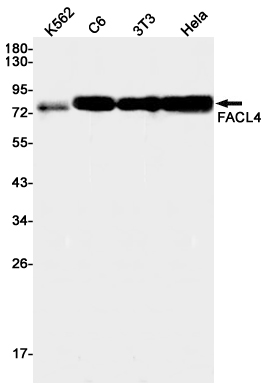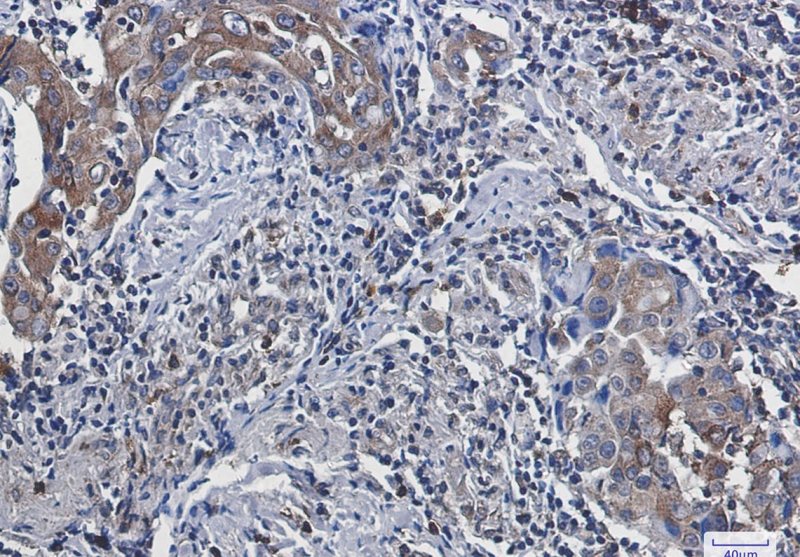

| WB | 1/500-1/1000 | Human,Mouse,Rat |
| IF | 1/20 | Human,Mouse,Rat |
| IHC | 1/50-1/100 | Human,Mouse,Rat |
| ICC | 技术咨询 | Human,Mouse,Rat |
| FCM | 咨询技术 | Human,Mouse,Rat |
| Elisa | 咨询技术 | Human,Mouse,Rat |
| Aliases | ACS4; FACL4; LACS4; MRX63; MRX68 |
| Entrez GeneID | 2182 |
| WB Predicted band size | Calculated MW: 79 kDa; Observed MW: 79 kDa |
| Host/Isotype | Rabbit IgG |
| Antibody Type | Primary antibody |
| Storage | Store at 4°C short term. Aliquot and store at -20°C long term. Avoid freeze/thaw cycles. |
| Species Reactivity | Human,Mouse,Rat |
| Immunogen | A synthetic peptide of human FACL4 |
| Formulation | Purified antibody in TBS with 0.05% sodium azide,0.05%BSA and 50% glycerol. |
+ +
以下是关于FACL4(ACSL4)抗体的3篇参考文献及其摘要概括:
1. **"ACSL4 dictates ferroptosis sensitivity by shaping cellular lipid composition"**
- **作者**: Doll, S. et al.
- **摘要**: 该研究通过开发特异性ACSL4抗体,揭示了ACSL4在调控细胞脂质组成及铁死亡(ferroptosis)中的关键作用。实验表明,ACSL4通过促进多不饱和脂肪酸的酯化驱动铁死亡,抗体用于检测其在多种癌细胞系中的表达水平。
2. **"Expression of ACSL4 in breast cancer and its association with prognosis"**
- **作者**: Kuwata, H. et al.
- **摘要**: 研究利用ACSL4抗体进行免疫组化分析,发现ACSL4在三阴性乳腺癌中高表达,且与患者不良预后显著相关。结果提示ACSL4可能作为乳腺癌治疗的潜在靶点。
3. **"ACSL4 deficiency in human neurons alters membrane phospholipid composition and impairs dendritic morphogenesis"**
- **作者**: Baroncelli, L. et al.
- **摘要**: 通过Western blot和免疫荧光(使用ACSL4抗体),研究发现ACSL4基因缺陷导致神经元磷脂代谢异常及树突发育障碍,为X连锁智力障碍的机制提供了分子证据。
*注*:ACSL4(Acyl-CoA Synthetase Long Chain 4)常被简写为FACL4.相关文献多聚焦于其脂质代谢、铁死亡及疾病关联研究。以上文献中抗体主要用于蛋白表达检测及功能机制探索。
The Fatty Acid-CoA Ligase 4 (FACL4), also known as ACSF4. is an enzyme critical in lipid metabolism, catalyzing the conversion of long-chain fatty acids into fatty acyl-CoA esters. This step is essential for fatty acid utilization in energy production, membrane synthesis, and signaling pathways. FACL4 is distinct from other acyl-CoA synthetases due to its substrate specificity for very long-chain fatty acids and its localization, primarily in peroxisomes and mitochondria. Dysregulation of FACL4 has been linked to metabolic disorders, neurodegenerative diseases, and cancer, where altered lipid metabolism contributes to pathogenesis.
FACL4 antibodies are essential tools for studying the enzyme's expression, localization, and function in research. They are widely used in techniques like Western blotting, immunohistochemistry, and immunofluorescence to assess FACL4 levels in tissues or cell lines. Commercially available antibodies are typically raised in rabbits or mice, with validation across human, mouse, and rat samples. Specificity is a key consideration, as cross-reactivity with other FACL family members (e.g., FACL1-3) must be ruled out via knockout controls or peptide blocking. Recent studies highlight FACL4's role in cancer progression, where its overexpression in tumors correlates with enhanced lipid biosynthesis and cell proliferation. These antibodies thus support investigations into metabolic reprogramming in disease, offering insights for therapeutic targeting.
×